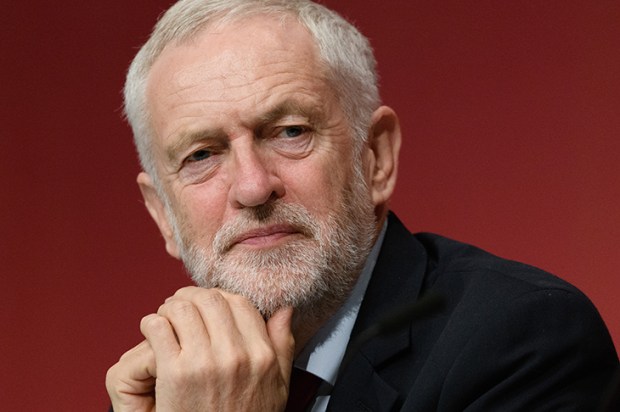An email exchange with a Conservative-leaning friend this week left me feeling sheepish. But if shameful my behaviour be, I’m not alone in the shame. I thought it worth sharing the conversation.
We were corresponding about Ed Miliband’s stand-off with the Unite trade union. In a message to my friend, I remarked: ‘It’s reaching the point where (paradoxically) EM’s tendency to take the line of least resistance may actually push him into confronting Unite.’ And that’s true: worms turn and it’s not always good politics to corner people. But it is the next part of the message that I’m hard-put to defend. If Miliband wimps out, I said, then ‘I remain vaguely worried that Labour may ditch Ed before the election and replace him with the more formidable Alistair Darling’.
‘Worried’? What’s going on here? If I believe the former chancellor would be good for the Labour party (and I do) and quite possibly a decent prime minister too (and I do) then shouldn’t I want him to have a chance to prove it? My friend was quick to pull me up. ‘The patriotic Tory in me would like a change of Labour leader in case Labour win.’ I was duly stung. ‘You shame me,’ was my reply. ‘How I admire your patriotism!’
Which I do. Nor does public-spirited patriotism entirely desert me. What Neil Kinnock, Peter Mandelson and Tony Blair were trying to do to change Labour was in the national interest and in Labour’s interests too, and I said and wrote as much. And (though this would be terrible news for the Tories) I do think Ed Miliband could render our politics a great service by standing up to Unite and the union movement, and refloating Labour on a million small donations from everyone in our country who wants a party on the centre-left that can look the world in the eye when it comes to its funding — which the Conservative party most assuredly cannot. I really think Mr Miliband could do this; and even that he might; and I’ve written that too. I’m one of the dwindling band of media commentators who don’t think Miliband is all that bad, or his situation beyond remedy.
But what if this were seriously to endanger the return of a Conservative-led government at the next election? The answer may dismay you but it’s the honest one: my goodwill does not run that far. Even if Miliband’s brilliant, I don’t want him to win. Even if the Tories were unimpressive, I’d want them to win.
I’ll always try to be fair in my commentary, as British tennis commentators tried to be fair at Wimbledon when Andy Murray triumphed. But there’s no question whose side I’m on. My heart does not leap when Labour scores, even when they’re in the right. And to claim that these loyalties in no way influence the way a political commentator forms and expresses his or her judgments is pure and pompous poppycock.
I’ll now offer you two plausible defences of tribalism among politics-watchers. First it may be said we need a variety of voices, counsels for the defence and counsels for the prosecution, and it’s no bad thing that we commentators assign ourselves roles, knowing that there are others to take the other point of view. Let the readers, who know where we’re coming from, decide. But we cannot square this with the pretence of pious impartiality that hangs over the pronouncements of most of us columnists. Were one to commence a column with ‘I have not reached this judgment entirely on the merits’, one would lose readers. But all too often it would be true.
Second, it may be said that if one is absolutely sure that the party one supports has sound instincts and a wise philosophy, while the party one opposes is fundamentally misguided, then one might want one’s own side to win even if a poor-quality administration were to result. Indeed were the other side to be led to victory by a capable and sensible leader who would make a good fist of government, one might count that as the worst possible result — the electorate might be deluded into thinking the rival party’s thinking was sound, and voting for them was now safe. Tony Blair’s temporary ascendency carried exactly that risk: people thought he’d changed his party but it now seems the changes were superficial. That is the argument I’d make about a Darling-led Labour party: sane leader, I’d say, but party as insane as ever, and in the end the old Adam will out. I’m tempted by this second defence.
But not quite persuaded. There’s a measure of rationalisation in it. Were it otherwise, I would welcome evidence that my adversary party really had changed; really was now safe to vote for. But the truth is that though I hope I’d be open to the possibility Labour had changed forever, and admit as much once it was clear, my heart would not be singing. And I’m afraid the reason for this unreasonable behaviour is desperately simple. Tribalism. It’s like football. The Tories are my team. I’m predisposed in their favour for better reasons than that, but for that reason at least. And I think its pull on me is probably quite strong.
During all my quarter-century as a commentator this has not appeared a huge problem for me, or for my fellow tribal cheerleaders for one party or another. It has been, after all, the way most of our readers or viewers have felt too. In the 1950s the Conservative party’s membership was three million, around which there was a much wider penumbra who almost always voted the same way. The same was true of Labour. When almost everybody was on one side or the other, there was a fair case for each side having pet commentators.
But Britain is changing. Voters are increasingly ‘promiscuous’ (note the pundits’ choice of word: one might equally say ‘independent-minded’). And I’m finding, in online responses to my own commentary and that of other columnists, that the charge ‘You would say that, wouldn’t you?’ is made more and more, and felt to be damaging. I don’t myself think the accusation should wound a Simon Heffer or a Polly Toynbee, whom I read for their dogged refusal to admit virtue in the enemy; but our readers do. Ever more powerfully do I feel the presentiment that our era of journalism is drawing to a close, and fast.
Got something to add? Join the discussion and comment below.
Get 10 issues for just $10
Subscribe to The Spectator Australia today for the next 10 magazine issues, plus full online access, for just $10.















Comments
Don't miss out
Join the conversation with other Spectator Australia readers. Subscribe to leave a comment.
SUBSCRIBEAlready a subscriber? Log in